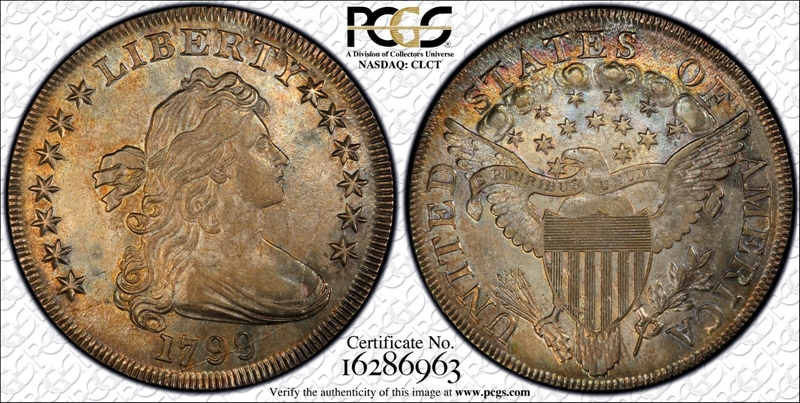1799 $1 BB-169 AU58 认证号16286963, PCGS号40060
拥有者评论
B-21,BB-169. Normal Design. Most in lower grades through EF. AU or finer is rare. PCGSAU58 (CAC). Exceptional luster. R3. Est.Pop. 450-800 coins. In middle CC statis.
专家评论
Q. David Bowers
The following narrative, with minor editing, is from my "Silver Dollars & Trade Dollars of the United States: A Complete Encyclopedia" (Wolfeboro, NH: Bowers and Merena Galleries, Inc., 1993). Note: the Notable Specimens list should be used with caution - it has been updated in my 2013 edition of "The Encyclopedia of United States Silver Dollars 1794-1804."Bolender 21, Haseltine 21
OBVERSE 11: Star 8 much closer to Y than star 1 to curl, or star 7 to L, or star 13 to bust. Star 1 is farthest from hair. In date, numeral 1 is close to curl. Slight die roughness below first star, between milling and curl. The second star on the obverse is repunched and the obverse shows die rust which becomes extensive on the late die state. The obverse is similar in appearance to BB-154 and BB-155; identification is simplified by the reverse which reuses the 1799 BB-157 die.
Obverse die used to strike 1799 BB-169 only.
REVERSE 0: See description under 1799 BB- 157. Far right edge of A is over junction of clouds 3 and 4.
Reverse die used to strike 1799 BB-167 (earlier use) and BB-169 (later use).
DIE STATES:
Die State I: Perfect obverse die. Reverse with light crack over AME, extending slightly to the left. Raised die breaks under A and left side of M. Specimen with perfect obverse die not known to exist.
Die State II: Obverse die now with hairline crack from border, up to right through 99 to drapery. Rare early die state.
Die State III: Obverse as preceding, but now with crack from bust through field to near star 12. Reverse with crack from border above F, through wing, to AME, thus expanding earlier crack.
Die State IV: Obverse now with these additional cracks: From border up through 7 to drapery. Earlier crack from bust now extends to touch star 11. Additional crack connects bust (where flesh meets drapery) to star 13, continuing irregularly upward through all stars on the right, through TY, faintly to The die state usually seen.
Die State V: Later die state, as exemplified by Gilhousen (Superior, 1973):1264, catalogued as "the die cracks and rust marks are more advanced than Bolender mentions," otherwise undescribed.
COLLECTING NOTES: 1799 BB-169 is in the middle range of availability among the varieties of this year. 450 to 850 are believed to exist. Most are in lower ,grades up through EF. AU and finer coins are rare.
NOTABLE SPECIMENS:
Harte Specimen. MS-63. Bowers and Ruddy Galleries, Roy Harte Collection, 1977:2787. "Choice Unc., lightly toned. Exceptionally well struck, particularly on the 13 stars on the obverse."
Holmes Specimen. MS-60. Stack's, Milton Holmes Collection, 1960:2253. "Brilliant Unc. example. Well struck, however a minor reverse scratch, from A of STATES to back of eagle's beak."
New Netherlands 54th Sale Specimen. MS-60. New Netherlands 54th Sale, April 1960: 656. "Long straight obverse crack slanting up through both 9's to drapery. Lightly toned, frosty, but somewhat softly struck Unc. Without obvious evidence of cleaning, rubbing, nicks, dents, or any other impairments."
DeCoppet Specimen. AU-58. James Kelly, Andre DeCoppet Collection, 1955. "Another rare variety, well struck and just a shade from Unc. Some mint lustre."
Hollinbeck-Kagin Specimen. AU-55. Hollinbeck-Kagin Sale, August 1970:1092. "Die flaws under Alvl, near Unc. with light golden patina."
F.U.N. Specimen. AU-53 PCGS. Mid American, Florida United Numismatists Sale, 1991:915. "Late die state with extensive rust on the obverse and heavy cracks on the reverse. Lightly worn and lustrous with mottled medium to deep pastels on the obverse and reverse. Boldly detailed with the centers showing nearly full detail."
Willasch Specimen. AU-53 PCGS. . Superior Galleries, H.Roland Willasch Collection, 1990:548. "Dark irregular toning, especially on the reverse. Hints of lustre remain in the fields. Well struck on the periphery, although the central reverse is a touch weak on the right wing of eagle. Struck from cracked dies, the obverse crack through the date is visible to the naked eye."
PCGS #
40060
设计师
Robert Scot
边缘
Lettered: HUNDRED CENTS ONE DOLLAR OR UNIT
直径
40.00 毫米
重量
27.00 克
铸币数量
423515
金属成分
90% Silver, 10% Copper
更高评级数量
0
评级较低的钱币数量
18
地区
The United States of America
价格指南
PCGS 数量报告
拍卖 - PCGS 评级的
拍卖 - NGC 评级的























